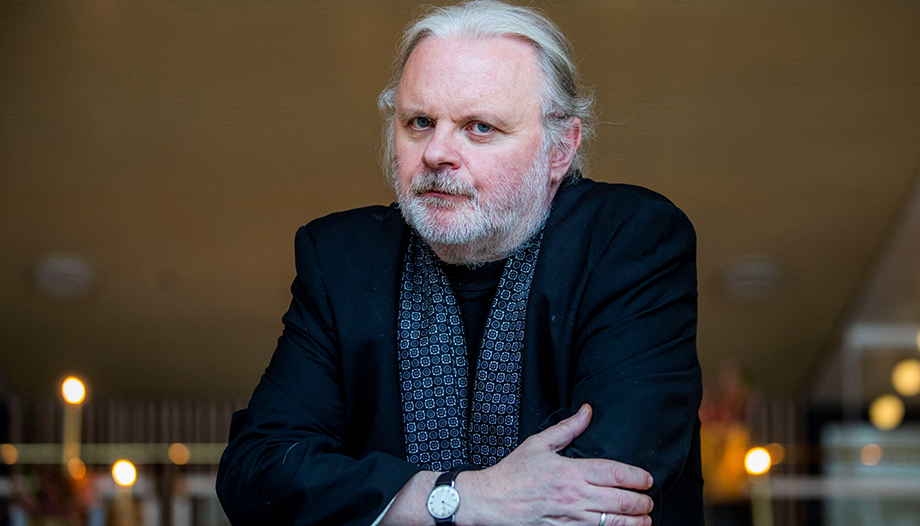It seems that in Norway there is a commitment to literature and reading: it is one of the countries where people read the most and writers receive scholarships and grants to be able to make a living from writing. We cannot deny that this always makes things easier. However, it is reasonable to think that the Nobel Prize in Literature of the year 2023, Jon Fosse, would also have shone in a less favorable environment. The Daily Telegraph described this author as one of the 100 greatest living geniuses of the moment. He has also been called the Samuel Beckett of the 21st century.
Born on September 29, 1959, he is married and has six children. He himself defines his life as boring: he gets up early, goes to bed early, doesn't go to parties... He considers that the best hours to write are between five and nine in the morning. However, in his boring life we find that he was in Spain when he was 16 years old. He tells as an anecdote that a policeman pointed a gun at him because he was sleeping on a bench in a station and that was illegal. He also declares himself an admirer of Lorca. In addition, he has accommodation in the Norwegian Royal Palace, apparently on loan from the royal family itself.
Works
His first novel was published in 1983. Later, in 1990, he started writing theater simply to earn more money, since at that time he did not have a stable income. He produced several plays a year until 2010, when - as he himself says - he got tired of writing theater. In 1999 his theatrical work Someone will come and, from there, he began to be translated and published in France and Germany, and then spread to many other countries. Although he is best known for his work as a novelist and playwright, especially because his theater is very innovative, he has also published short stories, essays, poetry and children's books.
His five essential works translated into Spanish are: Septologyabout the life of a painter who lives in a fjord and remembers his life, the life that was and the life that could have been; Trilogy, in which a couple of teenage farmers are expecting a child in the midst of many economic difficulties and a critical view of the society around them; The night sings its songs and other theatrical workswhich is a collection of plays that are worthwhile both for the themes they deal with and for the poetry they exude; Morning and afternoonwhere he describes two days in the life of a person: his birth and his death; and finally, Melancholywhich tells the story of the Norwegian painter Lars Hertervig and his time as a student in Düsseldorf.
He has been writing since he was 12 years old as a refuge from a sad adolescence, which had been preceded, however, by a happy childhood. His adult life has also had hard knocks. He gave up alcohol for religion: praying and going to Mass is his refuge, he said in an interview. In fact, he has been a Lutheran, an atheist, a Quaker and, since 2013, a Catholic.
A deep spirituality
Apart from his own search, he is a person with a deep spirituality, capable of connecting with the heart of whoever listens to him. He talks about love, heartbreak, guilt, faith, nature, death... And he forces the reader to talk to himself about these subjects. From his texts, we could say that he is a person who is at peace. He relates tough situations, and his characters sometimes lead somewhat lonely lives. However, both in the rhythm of his writing, in a kind of hypnotic spiral, and in the way his characters express themselves, the attitude is one of acceptance of reality and of other people. Nothing in his work is strident, and yet as a whole it is striking, it is a spotlight of weak light at first and then intense. Reading Morning and afternoon one loses the fear of dying.
As Luis Daniel Gonzalez writes about Septology, "in the way the psalmists pray, the narrator's phrases are like the spirals of incense smoke, similar but unequal, pronounced without fear of reiteration, with a clear will to insist on the same thing, something that gives intensity and adds new nuances to the feelings or impulses that one tries to express. [...] As the narrator explains, speaking of his art, and this can be applied to Septologyform and content have an invisible unity in a good painting, the spirit is in the painting, so to speak, and this happens in all works of art, in a good poem, in a good piece of music, and this unity is the spirit of the work.".
Jon Fosse tells his story, he tells what happens to the character, but, above all, what the character thinks about what happens to him. It is a mental reflection that, nevertheless, describes an emotional state. It is a reading that makes you alert, in that alertness that is concentration and peace. The alertness in which you are when a job makes you focus all your abilities on what you do and, at the same time, frees you from everything else and fills you with energy. The absence of periods in her texts generates a musicality and a rhythm that surrounds and inspires you. It is a demanding and generous writing with the reader.
Fosse justifies the absence of periods in many of his texts with the need for correct expression. The dots are a means, the expression is the end. It is his way of demonstrating that art is above technique, spirituality and reality above the norm. It is the water that passes through the rocks and forms the valley. His reading passes through the senses and reaches the heart. It is not easy to read at times, but the effort is worth it.








